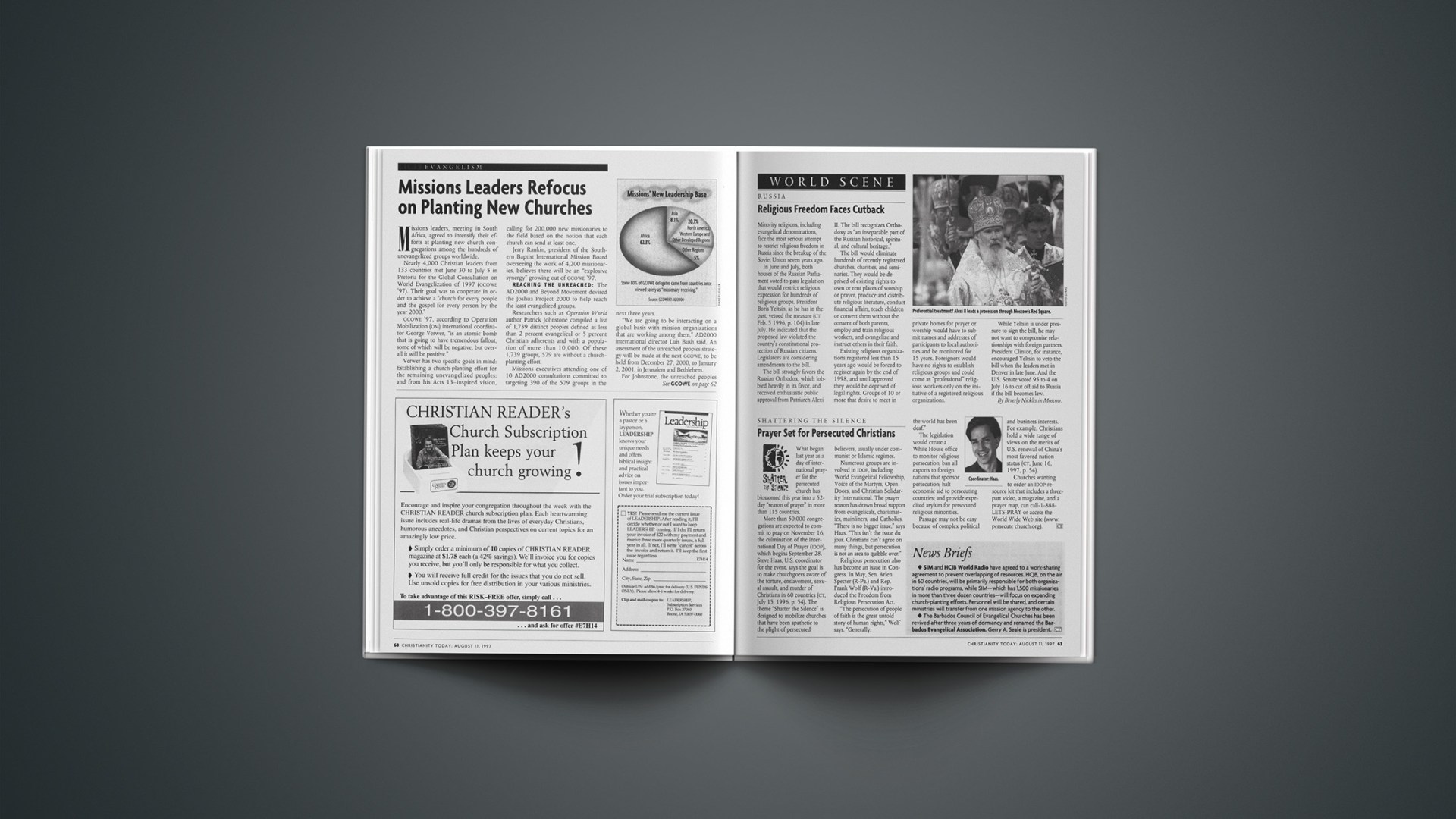Missions leaders, meeting in South Africa, agreed to intensify their efforts at planting new church congregations among the hundreds of unevangelized groups worldwide.
Nearly 4,000 Christian leaders from 133 countries met June 30 to July 5 in Pretoria for the Global Consultation on World Evangelization of 1997 (GCOWE ’97). Their goal was to cooperate in order to achieve a “church for every people and the gospel for every person by the year 2000.”
GCOWE ’97, according to Operation Mobilization (OM) international coordinator George Verwer, “is an atomic bomb that is going to have tremendous fallout, some of which will be negative, but overall it will be positive.”
Verwer has two specific goals in mind: Establishing a church-planting effort for the remaining unevangelized peoples; and from his Acts 13-inspired vision, calling for 200,000 new missionaries to the field based on the notion that each church can send at least one.
Jerry Rankin, president of the Southern Baptist International Mission Board overseeing the work of 4,200 missionaries, believes there will be an “explosive synergy” growing out of GCOWE ’97.
REACHING THE UNREACHED: The AD2000 and Beyond Movement devised the Joshua Project 2000 to help reach the least evangelized groups.
Researchers such as Operation World author Patrick Johnstone compiled a list of 1,739 distinct peoples defined as less than 2 percent evangelical or 5 percent Christian adherents and with a population of more than 10,000. Of these 1,739 groups, 579 are without a church-planting effort.
Missions executives attending one of 10 AD2000 consultations committed to targeting 390 of the 579 groups in the next three years.
“We are going to be interacting on a global basis with mission organizations that are working among them,” AD2000 international director Luis Bush said. An assessment of the unreached peoples strategy will be made at the next GCOWE, to be held from December 27, 2000, to January 2, 2001, in Jerusalem and Bethlehem.
For Johnstone, the unreached peoples movement is gaining momentum. “We got much further than most people realized,” he told CT. Delegates noted, however, that the work is most pressing in the Muslim nations of North Africa, the Middle East, and Asia.
BUSINESS NETWORK: J. Gunnar Olson, president of the International Christian Chamber of Commerce, is developing a business network to facilitate evangelistic outreach.
The business leaders have pledged to focus on the West African country of Benin, whose President, former Marxist-Leninist Mathieu Kerekou, has converted to Christianity. Thirty-five Christian businessmen have accepted the government’s invitation to travel to Benin this month to consider ways to help.
Phill Butler, president of Interdev, a ministry partnership agency, says individual missions working in countries from Senegal to Mongolia are realizing that they cannot do the work alone.
Today, they are forming “strategic alliances” to eliminate duplication of efforts and cut costs.
Since 1985, Interdev has helped missions form 32 partnerships. Butler says it is important that cooperating groups are “building trust and consensus, making sure everybody is on the same page.”
RECONCILIATION: The conference also saw many displays of repentance among church leaders and groups. Southern Baptists acknowledged that they had been arrogant in the past in believing that they could “do by ourselves what it takes the whole body of Christ to do,” says Avery Willis, senior vice president for overseas operations of the International Mission Board.
OM’s Verwer repented for “badmouthing” and ridiculing the Southern Baptists. White South Africans sought forgiveness from Christians of other races for ignoring their needs in the days of apartheid rule. And K. P. Yohannan, president of Gospel for Asia, retracted earlier statements that American missionaries were not needed in India. He apologized and called for financing of national missionaries, or for Western missionaries to consider two-year terms on the subcontinent.
Copyright © 1997 Christianity Today. Click for reprint information.










